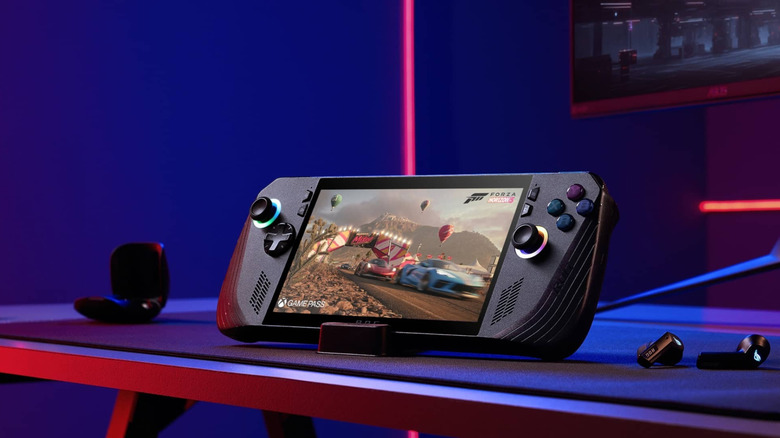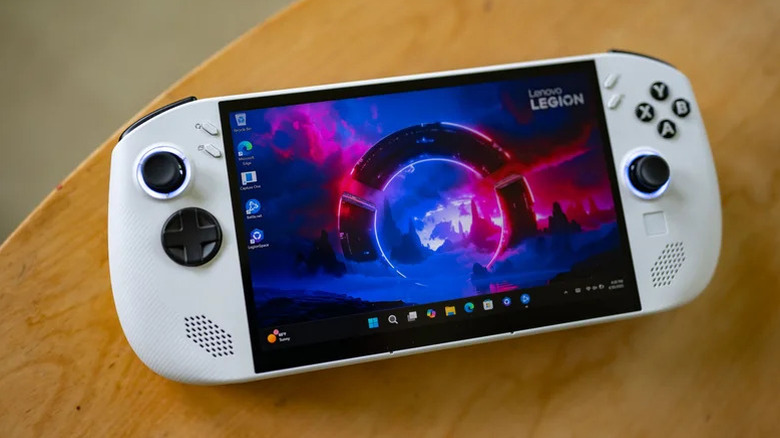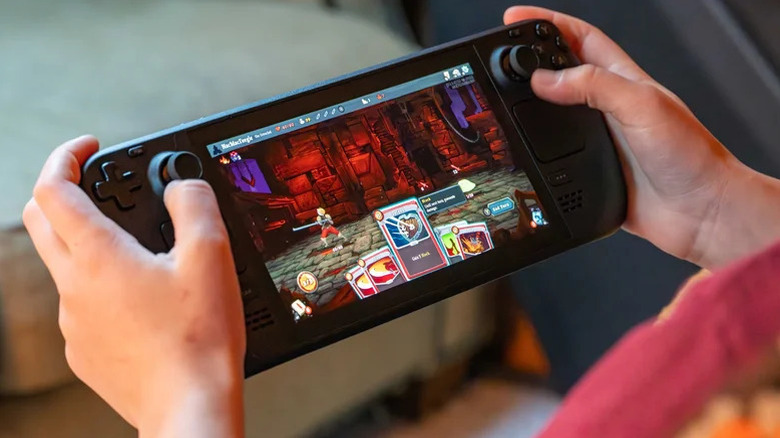Why Windows Isn't The Ideal OS For Gaming Handhelds
Decades after Nintendo popularized handheld gaming with devices like the Gameboy, portable consoles saw a new resurgence in the 2020s. This time, Nintendo faces fierce competition from a platform you wouldn't expect to see on a handheld device: full-fat Windows, of the same kind running on the best gaming laptop brands and high-end custom PCs. Devices like the Lenovo Legion Go and the recently announced Asus ROG Xbox Ally X aren't much more at their core than Windows laptops with gamepad controls and tiny displays.
Windows is the de facto platform for PC gaming, especially if you want to run the largest number of games on a portable screen. But although Microsoft is leaning into smaller form factors, Windows was never intended for them. It's a general-purpose OS with noticeable performance overhead and few native gaming features. To be fair, Microsoft seems aware of these issues and wants to address them with the upcoming Xbox experience for handhelds. But whether or not Microsoft manages to eke a few more frames out of those updates, Windows will never be a gaming-first OS.
It wasn't until recently that consumers could directly compare gaming handheld operating systems. However, with Valve pushing hard on its Linux-based SteamOS and opening it up to new handhelds, it's easier than ever to see how much Microsoft's legacy OS is to blame for some big issues related to handheld gaming. Here's why Windows isn't the ideal OS for gaming handhelds, and why that's actually an exciting proposition for the future.
Windows shows its bloat on slimmer devices
For years now, the most well-known gaming handheld aside from Nintendo's Switch has been the Valve Steam Deck. Although the Steam platform is almost synonymous with Windows gaming, the Steam Deck runs Valve's custom version of Linux, SteamOS. But it wasn't until recently that SteamOS made its way to other devices, allowing head-to-head comparisons between Valve's platform and Windows. The Lenovo Legion Go S, previously only available as a Windows device, recently launched a SteamOS variant. When both were put through their paces in testing, the results were unexpected.
Being Linux-based, SteamOS can only run a handful of games natively. Others are instead run through an emulation layer called Proton. You'd generally expect an emulated game to run worse than a native one, but the opposite happened in this case. In Ars Technica's testing, SteamOS produced significantly higher performance in almost every title tested, taking some games from unplayably sluggish to downright decent. YouTuber Dave2D found similar results, publishing them in a video titled "Windows Was The Problem All Along." The clear conclusion is that Windows — especially on handhelds — is often a resource hog that has trouble getting out of its own way and allowing games to perform at their best. But the future of portable PC gaming is still bright thanks to SteamOS and other Linux projects.
SteamOS and other Linux solutions could be the future of handheld PC gaming
The Steam Deck and Steam Deck OLED may be the most popular SteamOS devices, but the operating system itself has been in development for over a decade. In 2013, the company's co-founder, Gabe Newell, proclaimed that "Linux and open source are the future of gaming." As he saw it, corporate bureaucracy at Microsoft was holding Windows back from its potential, whereas Linux was free from such restrictions. Valve put its money where its mouth was. A small number of set-top consoles called Steam Machines hit the market in 2015, running an early SteamOS build, but the effort was short-lived.
The Steam Deck changed those fortunes. The appetite for a more capable competitor to the original Nintendo Switch was palpable when Valve announced it in 2021, and it sold an estimated 1.6 million units in its first year of sales. The Steam Deck was likely the first experience many of its owners had with PC gaming on Linux, and it was blissfully free of some of the friction Windows introduces to gaming. In SlashGear's review of the Windows-powered Legion Go, reviewer Andy Zahn loved the hardware but called out Windows 11 as an Achilles heel. With the SteamOS version of that device out now, other devices running SteamOS — or perhaps even another gaming-focused version of Linux — are likely to follow close behind. The future of handheld PC gaming looks increasingly like the Steam Deck, and Valve has even released installation instructions for other AMD-based handhelds, though it only mentions the Asus ROG Ally is mentioned by name.


